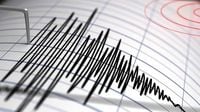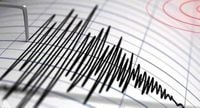An earthquake measuring 5.6 on the Richter scale struck off the coast of Sulawesi Island, Indonesia, early on April 17, 2025. According to the United States Geological Survey (USGS), the seismic event occurred at 00:51 universal time, approximately 46 kilometers southeast of the city of Modisi. The earthquake's epicenter was located at a depth of 10 kilometers beneath the Earth's surface.
Despite the earthquake's intensity, there have been no immediate reports of damage or injuries. Local authorities are continuing to monitor the situation closely, but as of now, the impact appears to be minimal. The region is prone to seismic activity due to its location along the Pacific Ring of Fire, an area known for frequent earthquakes and volcanic eruptions.
The USGS has emphasized that while the earthquake was significant, the depth at which it occurred likely mitigated potential damage. Seismologists often note that deeper earthquakes tend to cause less surface shaking than those that occur closer to the surface. This could explain why the reports coming in from the region have not indicated any casualties or substantial property damage.
Residents in the affected areas reported feeling the tremors, but many remained calm, as earthquakes of this magnitude are not uncommon in Indonesia. The country experiences thousands of earthquakes each year, with varying degrees of intensity. Emergency services in Indonesia are well-prepared for such events, having developed extensive protocols for earthquake response.
Indonesian authorities have been proactive in educating the public about earthquake safety. Many residents are familiar with the procedures to follow during an earthquake, including finding shelter under sturdy furniture and staying away from windows. The government also conducts regular drills to ensure that communities are prepared for potential seismic events.
In recent years, Indonesia has experienced several significant earthquakes, including a devastating 7.5 magnitude earthquake in 2018 that struck the island of Sulawesi, leading to widespread destruction and loss of life. That event highlighted the importance of preparedness and rapid response in mitigating the impact of such natural disasters.
As news of the recent earthquake spreads, officials are urging residents to remain vigilant and to report any aftershocks or unusual occurrences. The USGS continues to monitor the seismic activity in the region and will provide updates as necessary.
Experts advise that while the immediate threat may have passed, it is crucial for residents to stay informed about the risks associated with living in a seismically active area. Regular updates from authorities and scientific organizations can help keep the public aware of potential hazards.
In conclusion, while the earthquake off the coast of Sulawesi Island was significant, the lack of reported injuries or damage is a relief to both local residents and authorities. As Indonesia continues to navigate its challenges with natural disasters, the resilience and preparedness of its communities remain vital.





